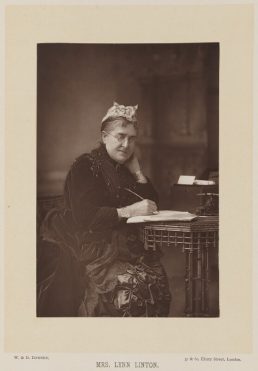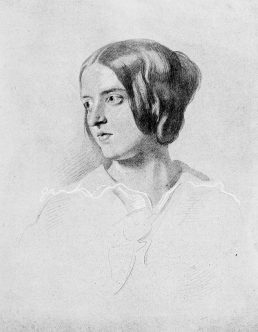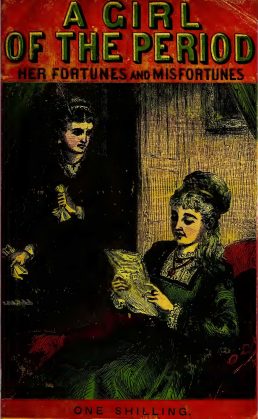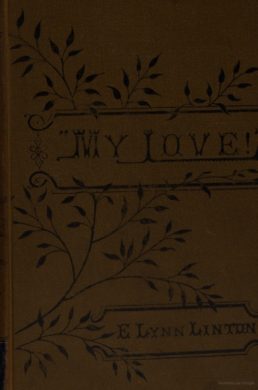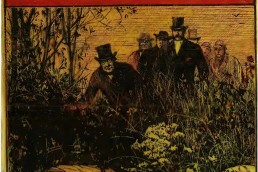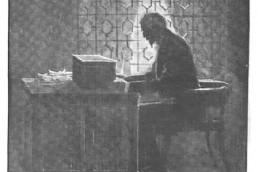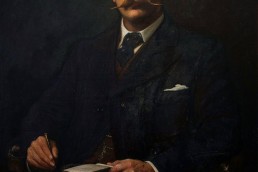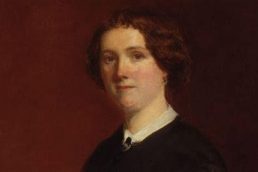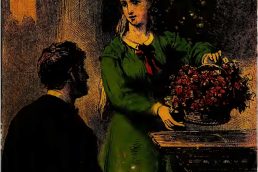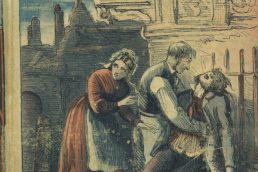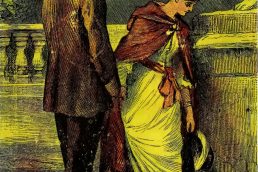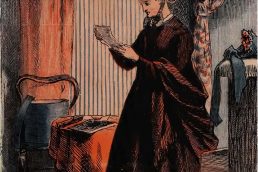Serialised fiction in the Bolton Weekly Journal - My Love (1880-81) by Eliza Lynn Linton
Eliza Lynn Linton was a distinguished woman writer and democrat who impressed Charles Dickens, knew Thackeray, and was patronised in kindly fashion by Walter Savage Landor, who addressed her as his daughter, and she as his father. She was, in fact, the daughter of a country vicar from Keswick in the Lake District, whose wife died when Eliza was only five months old. Despite being an educated man himself, the Rev. Lynn largely left the children of the marriage to raise themselves and Eliza used the library at their vicarage home to form her ideas to which she remained true all her life. The Gloucester Journal dated 13th August 1904, describes the Rev. Linton’s answer as to what he intended to do with his five motherless children to be: “I shall sit in my study and smoke my pipe and commit them to Providence.” Providence clearly provided the young Eliza with the inspiration and education that gave her the basis for her future independence.
My Love (1880-81) is a story that tells of sacrifice where true love is abandoned for material reasons as well as the forceful dominance of iron fist in velvet glove style of parentage of a heroine’s father. It is, in essence, an exploration of various female duties in the Victorian era. The Pall Mall Gazette of 25th June 1881 relates how Cyril Ponsonby writes “My Love, My Love” in the mist of a train carriage window as he goes to meet Stella Branscombe his mutually affectionate fiancée with all hope in front of them, he having secured financial stability by passing the Indian Civil Service examination. Melodramatically, a year later, he is in the same railway carriage and notices his earlier window writing is still visible. However, on this contrastingly unhappy occasion Stella jilts him because of perceived duty to her conniving father. Meanwhile, another character, Augusta Latrobe, sacrifices her love for Sandro Kemp on the altar of duty to provide an affluent home for her son from a previous marriage.
The anonymous literary reviewer of ‘Mrs Lynn Linton’s New Novel’ published in the Pall Mall Gazette dated 25th June 1881, gives the opinion that: “Mrs Lynn Linton’s new novel is not at all what its title suggests. It is more a study of duty than of passion, of character than of sentiment. Love is starved throughout in the interest of duty…” (pp.19-20). This same reviewer comments on Linton’s tendency to superfluous detailing of her characters in her efforts to achieve realism, resulting in the further opinion that though the book is well-written and interesting, that it is too long. In hindsight, one might wonder if this long-windedness results from the origin of the novel as serialised fiction. It seems logical to suppose that newspaper readers would want their money’s worth from a serialised story and at the same time the publisher would want the story to extend over as many issues as possible, thus retaining the readership. Though Linton is best known to us as an author of fiction, it is worth while recalling that she also made a name for herself in journalism and would therefore be familiar with making her words fit the available space in a periodical. Writing stories of moral and social interest, she reveals her political inspirations, which began with Daniel O’Connell, the advocate of freedom and equal rights, who waved at her and friends as they cheered his passing when Eliza was twelve years old, (‘Mrs Lynn Linton’, Times of India, 11th April 1884). O’Donnell was the self-promoted King of Ireland (O’Leary, 2019), who fought by every peaceful manner for Irish and English Catholic emancipation and Linton never lost any of her loyalty to those views as she grew to be a “Liberal of the Liberals, a philosophic Republican and a Democrat” (‘Mrs Lynn Linton’, Times of India, 11th April 1884, p.5). She also contributed to The Morning Chronicle up to three times a week when Dickens was the editor of that periodical.
Renowned as the first woman journalist, successful author and political activist, yet not a suffragette, she was notable as female at a time when women were not recognised as equals of men. She clearly had power to influence men as she was immortalised in sonnet by William Savage Landor who loved his protégé as a daughter, and his sonnet quoted here in the Gentlewoman of 21st November 1891:
Other voices since
Have made their softness sound through manly tones,
And overpower them. In our days, so sweet,
So potent, so diversified, is none
As thine, Protectress of Aspasia’s fame,
Thine, golden shield of matchless Pericles,
Pure heart and lofty soul, Eliza Lynn.
Vaunted also by the Gentlewoman and the Bradford Daily Telegraph as the natural successor to George Eliot, how can we fail to love and admire this warm and determined woman who survived chaotic childhood and unhappy marriage in which she was separated from her husband, who went to America, to become a strong role model not only for Victorian women but also, potentially, for women of the twenty-first century.
Read Mrs. Lynn Linton: Her Life, Letters, and Opinions (1901), below:
Bibliography
Anon. (1898) A Remarkable Writer. Buckingham Express. 23rd July, p.2. [Online] Available from: <https://www.britishnewspaperarchive.co.uk/viewer/bl/0002204/18980723/031/0002> [Accessed 19 May 2021].
Anon. (1884) Mrs Lynn Linton. Times of India, 11th April, p. 5. [Online] Available from: <https://www.britishnewspaperarchive.co.uk/viewer/bl/0002850/18840411/091/0005> [Accessed 19 May 2021].
Anon. (1889) Mrs. Lynn Linton. Bristol Times and Mirror, 13th September. p.1. [Online] Available from: <https://www.britishnewspaperarchive.co.uk/viewer/bl/0000984/18890913/013/0001> [Accessed 19 May 2021].
Anon. (1881) Mrs Lynn Linton’s New Novel. Pall Mall Gazette, 25th June, pp.19-20. [Online] Available from: <https://www.britishnewspaperarchive.co.uk/viewer/BL/0000098/18810625/034/0020> [Accessed 19 May 2021].
Anon. (1881) “My Love.” Bradford Daily Telegraph, 4th February, p.1. [Online] Available from: <https://www.britishnewspaperarchive.co.uk/viewer/bl/0000629/18810204/033/0002> [Accessed 19 May 2021].
Anon. (1880) “My Love,” New and Splendid Serial Story by Mrs. Lynn Linton. Belfast Telegraph, 4th October, p.4. [Online] Available from: <https://www.britishnewspaperarchive.co.uk/viewer/bl/0001631/18801004/116/0004> [Accessed 19 May 2021].
Anon. (1904) Some Minor Celebrities of the Lake District. Eliza Lynn Linton: The Woman. The Gloucester Journal, 13th August, p.6. [Online] Available from: <https://www.britishnewspaperarchive.co.uk/viewer/bl/0000532/19040813/142/0006> [Accessed 19 May 2021].
Anon. (1891) Women Who Write: Mrs Lynn Linton. Gentlewoman. 21st November, p.691. [Online] Available from: <https://www.britishnewspaperarchive.co.uk/viewer/bl/0003340/18911121/096/0021> [Accessed 19 May 2021].
Lawrence, S. (1901) [Eliza Lynn Linton, circa 1839]. [Illustration] In: Layard, G. S. (1901) Mrs Lynn Linton: Her life, letters, and opinions. London: Methuen & Co. p.31. [Online] Available from: <https://archive.org/details/cu31924013517002/page/n51/mode/2up?view=theater> [Accessed 19 May 2021].
O’Leary, O. (2019) Daniel O’Connell, the greatest of all politicians. The Irish Times, 17th August. [Online] Available at: <https://www.irishtimes.com/culture/heritage/daniel-o-connell-the-greatest-of-all-politicians-1.3986230> [Accessed 19 May 2021].

